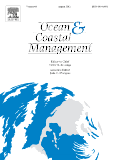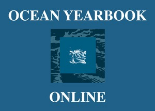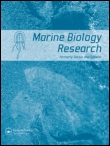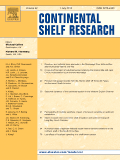
Indian Journal of Geo-Marine Sciences
Scope & Guideline
Exploring the Depths of Marine Knowledge
Introduction
Aims and Scopes
- Marine Biodiversity and Ecology:
The journal publishes research on the diversity of marine species, their ecological relationships, and the impacts of environmental changes on marine ecosystems. - Coastal Management and Conservation:
Research articles often address issues related to coastal protection, habitat restoration, and sustainable management practices for coastal resources. - Climate Change and Its Impacts:
The journal includes studies that investigate the effects of climate change on marine environments, including temperature variations, ocean acidification, and related ecological responses. - Marine Biotechnology and Bioactive Compounds:
A focus on the extraction and application of bioactive substances from marine organisms, including studies on antimicrobial properties and potential pharmaceutical uses. - Fisheries Science and Management:
The journal contributes to the understanding of fish populations, fisheries dynamics, and sustainable fishing practices, emphasizing the importance of data-driven management. - Pollution and Environmental Monitoring:
Studies on the impact of pollutants (such as heavy metals and microplastics) on marine life and ecosystems, along with monitoring methodologies for coastal waters. - Geophysical and Geological Studies:
Research on the geological and geophysical aspects of marine environments, including sedimentology, coastal erosion, and the impacts of natural disasters.
Trending and Emerging
- Climate Resilience and Adaptation Strategies:
There is an increasing emphasis on research aimed at developing climate-resilient coastal protection measures and adaptation strategies for marine ecosystems. - Microbial Ecology and Bioremediation:
Studies focusing on the role of marine microorganisms in pollution remediation and their applications in biotechnological processes are gaining traction. - Marine Conservation Genetics:
Research on genetic diversity and conservation genetics of marine species is emerging, highlighting the importance of genetic studies in conservation efforts. - Impact of Anthropogenic Activities on Marine Ecosystems:
There is a growing focus on the impacts of human activities such as pollution, coastal development, and overfishing on marine biodiversity and ecosystem health. - Marine Climate Change Impacts:
Research articles are increasingly addressing the specific impacts of climate change on marine species and ecosystems, particularly in the context of the Indian Ocean. - Sustainable Aquaculture Practices:
Emerging themes around sustainable aquaculture practices and their ecological impacts reflect a shift towards responsible marine resource management.
Declining or Waning
- Traditional Fisheries Techniques:
There has been a noticeable decline in studies focusing solely on traditional fishing methods, with more emphasis shifting towards sustainable practices and technological advancements. - Invasive Species Assessments:
Research on invasive marine species has become less prominent, possibly due to a broader focus on biodiversity conservation and ecosystem management. - Oceanographic Modeling Studies:
While oceanographic modeling remains important, the number of publications in this area has decreased as the journal expands its scope to include more empirical and applied research. - Historical Marine Studies:
Research concentrating on historical marine environments and species distributions is less frequently published compared to contemporary ecological and management studies. - Marine Engineering Innovations:
The focus on engineering aspects related to marine structures and technologies has waned as the journal emphasizes ecological and environmental studies.
Similar Journals

OCEAN & COASTAL MANAGEMENT
Exploring the Depths of Aquatic ScienceOCEAN & COASTAL MANAGEMENT is a premier journal dedicated to the multifaceted fields of oceanography, aquatic science, and coastal management. Published by ELSEVIER SCI LTD and located in the United Kingdom, this esteemed journal boasts a remarkable Q1 ranking in prestigious categories, including Aquatic Science and Oceanography, reflecting its influential contributions to the field since its inception in 1992. The journal is recognized for its high impact, boasting a commendable presence in Scopus rankings across related disciplines, with notable placements in the 94th percentile for Aquatic Science and 92nd percentile for Oceanography. Although it operates under a subscription model, OCEAN & COASTAL MANAGEMENT continues to serve as a vital resource for researchers, professionals, and students seeking to advance their understanding of coastal ecosystems and effective management strategies. Through rigorous peer-reviewed research, the journal aims to foster knowledge exchange and practical applications in policy-making and environmental stewardship, making it an essential read for anyone engaged in the preservation and sustainable use of oceanic resources.

Ocean Yearbook
Illuminating the Intersection of Law and Oceanic StewardshipOcean Yearbook, published by BRILL, is a leading academic journal in the field of maritime law and ocean governance, providing a comprehensive platform for researchers and practitioners in this vital area. With an ISSN of 0191-8575 and E-ISSN 2211-6001, this journal offers valuable insights and critical analyses on contemporary issues affecting the world's oceans, promoting interdisciplinary dialogue among scholars in law, environmental studies, and policy-making. Currently ranked in the Q2 quartile for Law, this journal is positioned among the top-tier publications, reflecting its commitment to academic excellence and relevance. Ocean Yearbook is essential reading for those looking to stay abreast of legal developments and emerging challenges in ocean governance, contributing significantly to policy discussions and academic scholarship worldwide. Its accessibility through subscription, combined with its ongoing commitment to high-quality research, makes it an indispensable resource for students, researchers, and professionals dedicated to understanding and protecting marine ecosystems.

Jurnal Ilmu dan Teknologi Kelautan Tropis
Bridging research and practice in tropical marine technology.Jurnal Ilmu dan Teknologi Kelautan Tropis (ISSN: 2087-9423, E-ISSN: 2085-6695) is a premier scientific journal published by the Indonesian Oceanologists Association in collaboration with the Bogor Agricultural University, specifically from the Department of Marine Science and Technology. This journal is committed to advancing the field of tropical marine science, publishing high-quality research that addresses pressing issues in oceanography, marine ecosystems, and sustainable practices in tropical regions. By facilitating open access to valuable scientific knowledge, Jurnal Ilmu dan Teknologi Kelautan Tropis aims to engage researchers, professionals, and students alike, fostering collaboration and innovation in marine research. Located in the picturesque region of Bogor, West Java, Indonesia, this journal serves as a vital platform for disseminating findings that contribute to the conservation and effective management of tropical marine resources.

Journal of Ocean University of China
Connecting Scholars to Shape the Future of the SeasThe Journal of Ocean University of China, ISSN 1672-5182, is a premier academic journal dedicated to advancing the fields of Ocean Engineering and Oceanography. Published by the esteemed Ocean University of China, the journal serves as a vital platform for researchers, professionals, and students to disseminate groundbreaking findings and foster collaboration in marine science and engineering. With a commitment to quality, the journal currently holds a Q3 ranking in both Ocean Engineering and Oceanography as of 2023, indicating its significant contributions within the scientific community. The journal's scope encompasses a wide range of topics including marine technology, ecological studies, and coastal management, all aimed at enhancing the understanding and utilization of oceanic resources. Although currently not Open Access, it continues to attract submissions from renowned scholars, ensuring a diverse and innovative range of research. By providing access to cutting-edge research and practical insights, the Journal of Ocean University of China plays a critical role in shaping the future of ocean sciences and engineering.

Research in Marine Sciences
Championing interdisciplinary approaches to oceanic challenges.Research in Marine Sciences, ISSN 2538-5542, is a leading journal published by ARMAN DARYA INC, specializing in the dynamic and interdisciplinary field of marine science. With a commitment to advancing knowledge in areas such as marine ecology, oceanography, and marine conservation, this journal provides a collaborative platform for researchers, professionals, and students to disseminate their findings. Although it operates under a traditional subscription model, the journal ensures that the latest research is accessible to a wide audience, promoting the understanding of marine environments crucial for biodiversity and sustainability. The journal aims to bridge the gap between theoretical research and practical applications, emphasizing the need for rigorous studies that address pressing marine issues in a rapidly changing world. By contributing to the body of literature in marine sciences, Research in Marine Sciences plays a vital role in shaping the future of marine research and policy-making.

AFRICAN JOURNAL OF MARINE SCIENCE
Navigating the challenges of Africa's dynamic marine landscapes.AFRICAN JOURNAL OF MARINE SCIENCE is a premier academic journal dedicated to advancing the field of aquatic sciences and ecological studies, published by Taylor & Francis Ltd. Established in 2003 and based in South Africa, this journal provides a vital platform for researchers, professionals, and students interested in the diverse and dynamic marine ecosystems of Africa. With an impressive impact factor reflected in its Q2 quartile ranking in both Aquatic Science and Ecology, Evolution, Behavior and Systematics categories, the journal showcases innovative research that addresses pressing environmental challenges. Open access options facilitate broad dissemination of knowledge, ensuring that cutting-edge findings are accessible to all stakeholders in the marine research community. As it converges towards its impressive milestone year of 2024, the AFRICAN JOURNAL OF MARINE SCIENCE serves as an essential resource for fostering scientific discourse and collaboration across the continent and beyond.

International Journal of Marine and Coastal Law
Fostering Dialogue on Contemporary Marine Legal ChallengesThe International Journal of Marine and Coastal Law, published by Martinus Nijhoff Publishers, is a leading academic periodical dedicated to the exploration of legal aspects related to marine and coastal environments. With a strong emphasis on interdisciplinary research, this journal serves as a vital resource for scholars, practitioners, and policymakers engaged in areas such as environmental science, oceanography, and law. Since its inception in 1986, the journal has continuously evolved to address contemporary challenges in the field, boasting a commendable Q2 ranking in Law and Q3 rankings across various relevant categories. The journal facilitates rigorous discourse on pressing issues, providing a platform for high-quality research that aims to inform legal frameworks and enhance sustainable practices. Although it does not offer open access, the journal’s impact extends to its notable Scopus rankings and its essential role in shaping legal discourse on marine and coastal management. Researchers and professionals will find invaluable insights and scholarly contributions that are crucial for advancing knowledge and policy in this critical area of study.

Marine Biology Research
Innovating research for thriving ocean ecosystems.Marine Biology Research is a premier journal published by Taylor & Francis, focusing on the dynamic field of marine biology and its intersecting realms of aquatic science, ecology, and oceanography. Since its inception in 2005, this journal has served as a crucial platform for researchers and professionals to disseminate their findings, with a vision extending to 2024 and beyond. The journal is recognized with a Q3 quartile ranking in both Aquatic Science and Ecology, Evolution, Behavior and Systematics, underscoring its growing influence in these fields as evidenced by its Scopus rankings. Located in the United Kingdom, Marine Biology Research aims to foster collaboration and innovation through open access options, facilitating knowledge exchange among the academic community. With a steady commitment to advancing marine sciences, this journal is an invaluable resource for those dedicated to understanding and preserving our ocean ecosystems.

Ocean and Coastal Research
Advancing marine science for a sustainable future.Ocean and Coastal Research, published by the Institute Oceanográfico of the University of São Paulo, is an essential academic journal dedicated to advancing the fields of Aquatic Science, Oceanography, and Water Science and Technology. Established in 2020, the journal has quickly become a noteworthy platform contributing to the understanding and sustainable management of marine and coastal ecosystems, with an open access model that promotes the dissemination of critical research findings. Although currently categorized in the fourth quartile across its respective fields in 2023, the journal serves as an emerging repository of valuable insights for researchers, professionals, and students alike, aiming to make impactful discoveries that address contemporary challenges in ocean conservation and resource management. The journal's editorial team is committed to fostering interdisciplinary collaboration and upholding rigorous peer-review standards, thereby ensuring high-quality contributions that reflect the dynamic nature of marine science. With an E-ISSN of 2675-2824, all access to published articles is freely available, supporting global research efforts addressing crucial environmental issues.

CONTINENTAL SHELF RESEARCH
Unveiling the Secrets of the Continental ShelfCONTINENTAL SHELF RESEARCH, published by PERGAMON-ELSEVIER SCIENCE LTD, is an esteemed journal within the fields of Aquatic Science, Geology, and Oceanography, reflecting a compelling intersection of these disciplines. Since its inception in 1982, this journal has served as a premier platform for disseminating cutting-edge research relevant to the continental shelf ecosystem, including its geological features, biological resources, and physical processes. With a Category Quartile ranking of Q1 in Aquatic Science and prominent Q2 standings in Geology and Oceanography, it is recognized for its rigorous peer-review standards and impactful contributions, evidenced by its respective rankings in Scopus. Researchers and professionals are encouraged to engage with the journal's array of high-quality articles that not only enhance scientific understanding but also inform policy and conservation efforts. This dedication to advancing knowledge makes CONTINENTAL SHELF RESEARCH an essential resource for those passionate about marine and coastal studies in the United Kingdom and globally.